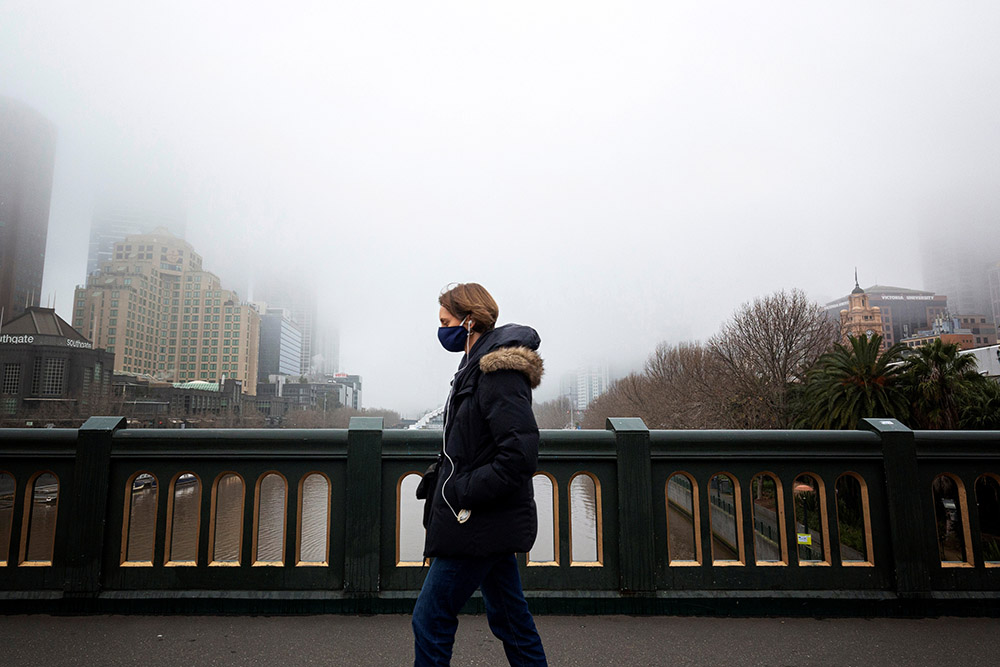
A person in a protective face mask walks along the Princes Bridge in Melbourne, Australia, July 17, 2020, during a lockdown in response to the coronavirus pandemic. (CNS/Reuters/Daniel Pockett)
... Who wait
for the end
of waiting
who wait
for the fullness
of time
who wait
emptied and
open and
ready
who wait
for you,
O bless.—From "Blessing for Waiting" in Jan Richardson's Circle of Grace
Every year, as Advent approaches (and the older I get, the faster Advent approaches) commentators offer their thoughts, their wisdom, their "take" on the season. Like Scripture and tradition, the liturgical seasons are bottomless wells of possibility, with water that can be calm and consoling or turbulent and disturbing.
This year, "turbulent and disturbing" feels about right.
Every year, the notion of "waiting" looms large in Advent prayers, reflections and commentary. Like Mary, we wait for, and prepare to celebrate, the birth of Jesus. While we bemoan annually how the year has flown, how much we feel we must do before Christmas and how "it doesn't feel like the season yet," deep down we also long for the promise of Advent, in both a spiritual and a secular sense. We long to be lifted up, challenged to rise above to-do lists and crowded calendars, and invited to find a quiet place within. In short, we too, like Mary, want to birth peace, hope and love.
Recently a friend's daughter-in-law gave birth unexpectedly, and worryingly, early. At the time of writing, the baby is still in intensive care with visitors limited due to her low weight — and of course, COVID-19. In most pregnancies, however, the timeline is predictable and parents-to-be know how long they have to set up the nursery, consider names and perhaps prepare an older child or children for the new arrival.
Even Mary, all those centuries ago, would have had some idea what to expect, and surely older women would have assisted and advised her, despite the scandal of her situation.
Most Australians in the last two years have experienced one or more lockdowns. Melburnians have spent longer in lockdown than residents of any city in the world. This is not exactly an accolade that was sought! People soon learned that the date a lockdown was supposed to end and the date it actually ended might be far apart. One wit said, "The worst part of a seven-day lockdown is the first six weeks!"
So lockdowns have echoes of the waiting of the pregnant woman, with the key difference being that the end of lockdown, and all it encompasses, is largely unknown.
As pregnancy proceeds, and the baby grows and asserts its presence, there are signs that a doctor can interpret and signs that only a mother can read. In these times of advanced technology, more is known about the baby's development at an earlier stage than ever before, and this hopefully removes some of the anxiety a mother might feel.
Advertisement
Living with a pandemic also involves technology — vaccines, testing, apps, as well as low-tech but amazingly varied masks. However, the outcome of community intervention, compliance (or lack thereof) and goal setting is unpredictable to say the least.
There is a saying, "If you want to make God laugh, outline your plans." Most of us have learned that pandemics, too, laugh at our plans. I highlighted in my diary all the events and appointments that were COVID-canceled. Talk about cancel culture!
As the season of Advent approaches, and life in places that have experienced lockdown is opening up, there is, I believe, an abiding uncertainty. Should we plan to travel interstate, or is it safer to remain within our own state, or even our local government area? Is the worst over, or is there another variant waiting in the wings? Have masks become a permanent accessory?
When Mary and Joseph found the humblest of accommodation in Bethlehem, they may have hoped, and believed, that once they could return to Nazareth among familiar people, all would be well. Yet the threat of Herod was looming, and when Jesus was presented at the temple, Simeon said prophetically to Mary, "Behold, this child is destined for the fall and rise of many in Israel, and to be a sign that will be contradicted (and you yourself a sword will pierce) so that the thoughts of many hearts must be revealed" (Luke 2:34-35).
These days, parents-to-be invest a great deal of time, thought, energy and perhaps money in preparing a nursery, ensuring the family car is adequate, making child care arrangements if necessary, even putting the child's name on a school list! It's doubtful Mary and Joseph had any of these concerns, yet through the ages, parents everywhere want for their children security, stability and lives of satisfaction.
Our celebrating of the lovely season of Advent can unintentionally give the impression that Christmas — with all its hopes that are only magnified this year for those deprived of contact with loved ones for many months — is an end in itself, rather than a beginning of a new era with consequences for the entire world.
This year, it feels like we all have a deeper understanding of Advent — not the neat four-week package with its purple drapes, wreaths and O antiphons (as well as Advent calendars bearing chocolate and endless reminders of how many days till Christmas), but the uncertainty, the almost-not-daring-to-hope and the underlying fear that must have been emblematic of Mary and Joseph's waiting for the Child to be born.
Bless all who wait for all that life has to offer in the fullness of time.
Bless all who wait for the end of waiting.
May your Christmas overflow with peace, hope and love!







